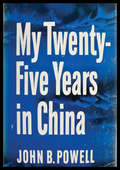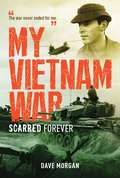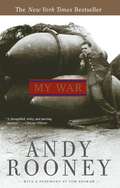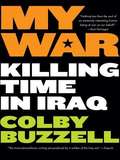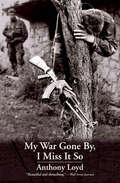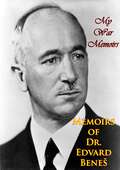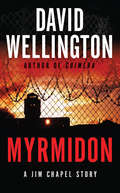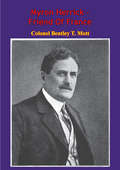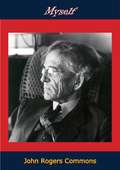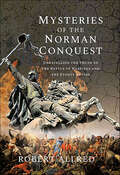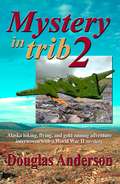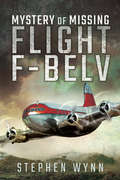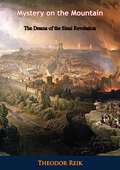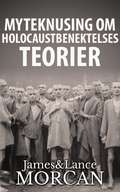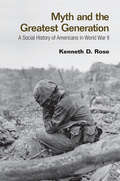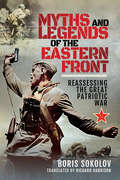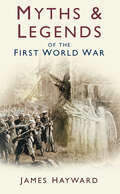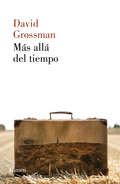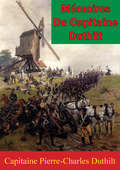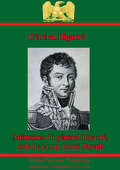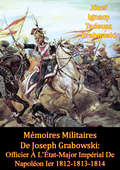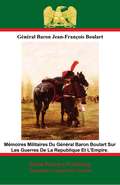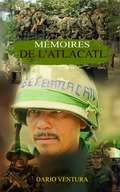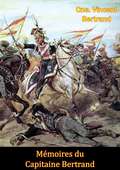- Table View
- List View
My Twenty-Five Years In China
by John B. PowellDuring the two decades ending at Pearl Harbor, Mr. Powell was owner and editor of the China Weekly Review. His opposition to Japanese expansion into China was consistent and bitter, and carried on at great personal risk.His chapters on this phase of recent Chinese history are written at first-hand and are important. It is in his discussion of internal Chinese affairs that he sometimes seems a less reliable guide, being thoroughly committed to Chiang Kai-shek and the Kuomintang.—Robert Gale Woolbert
My Vietnam War: Scarred Forever
by Dave MorganMy Vietnam War is Dave Morgan's story. A typical 20 year old, he was forced into extraordinary circumstances in Vietnam. Far from his carefree youth, the Vietnam War would expose Dave to an atmosphere of ever-present danger and sheer terror that would impact him forever. His return to a divided Australia would isolate him further. During his service Dave wrote home to his mother from Vietnam tracking the days and the events. In 1992, after his mother passed away, he found all of his letters with his own recollections and diary entries, and the short stories of seven other veterans, to capture the unbelievable danger and horror that these young men experienced in Vietnam. He also describes how Vietnam established life-long feelings of intense loyalty, trust and mateship between the men that served there. Dave's story focuses on his time as a soldier and his return psychologically exhausted to a divided nation.
My War
by Andy RooneyMy War is a blunt, funny, idiosyncratic account of Andy Rooney's World War II. As a young, naïve correspondent for The Stars and Stripes, Rooney flew bomber missions, arrived in France during the D-Day invasion, crossed the Rhine with the Allied forces, traveled to Paris for the Liberation, and was one of the first reporters into Buchenwald. Like so many of his generation, Rooney's life was changed forever by the war. He saw life at the extremes of human experience, and wrote about what he observed, making it real to millions of men and women. My War is the story of an inexperienced kid learning the craft of journalism. It is by turns moving, suspenseful, and reflective. And Rooney's unmistakable voice shines through on every page.
My War
by Colby BuzzellAn underemployed, skateboarding party animal, Colby Buzzell traded a dead-end future for the army--and ended up as a machine gunner in Iraq. To make sense of the absurd and frightening events surrounding him, he started writing a blog about the war--and how it differed from the government's official version. But as his blog's popularity grew, Buzzell became the embedded reporter the Army couldn't control--despite its often hilarious efforts to do so. The result is an extraordinary narrative, rich with unforgettable scenes: the Iraqi woman crying uncontrollably during a raid on her home; the soldier too afraid to fight; the troops chain-smoking in a guard tower and counting tracer rounds; the first, fierce firefight against the "men in black." Drawing comparisons to everything from Charles Bukowski to Catch-22, My War depicts a generation caught in a complicated and dangerous world--and marks the debut of a raw, remarkable new voice.
My War Gone By, I Miss It So
by Anthony LoydA “beautiful and disturbing” account of the Bosnian conflict by a war correspondent grappling with heroin addiction and a family legacy of military heroism (The Wall Street Journal). In an earlier era, Anthony Loyd imagines, he would have fought fascism in Spain. Instead, the twenty-six-year-old scion of a distinguished military family left England in 1993 to experience the conflict in Bosnia as a reporter. While he found his time serving in the British army during the Gulf War disappointingly uneventful, Loyd would spend the next three years documenting one of the most callous and chaotic clashes ever fought on European soil. Plunged into the midst of the struggle among the Serbs, Croatians, and Bosnian Muslims, Loyd saw humanity at its extremes, witnessing tragedy daily in city streets and mountain villages. Shocking and violent, yet lyrical and ultimately redemptive, Loyd’s memoir is an uncompromising feat of reportage, and one man’s on-the-ground look at Yugoslavia’s brutal dissolution. But Loyd’s personal war didn’t end after he emerged from the trenches. Addicted to the adrenaline of armed combat, he returned home to continue his own longstanding battle against drug addiction. “Battlefield reportage does not get more up close, gruesome, and personal. . . . The fear and confusion of battle are so vivid that in places, they rise like acrid smoke from the page.” —The New York Times “Loyd’s strongest writing is in his descriptions of carnage—of the sound and smell of shellfire; of the sexual release of blasting away with an automatic machine gun. . . . This is pure war reporting, free from the usual journalistic constraints that often give a false significance to suffering.” —Salon.com “First-rate war correspondence . . . [in] the great tradition of Hemingway, Caputo, and Michael Herr.” —The Boston Globe
My War Memoirs
by Dr Edvard BenešThe Czechoslovak minister of foreign affairs tells a detailed story of the revolutionary movement of the Czechs that led to the building of the new state, in the government of which he and President Masaryk have become the leaders.“THIS book contains a record of my wartime experiences. Life moves so rapidly that the approach of new political events is apt to make us forget the old ones too easily. Much of what I saw and heard during the war deserves to be remembered, and that is why I have decided to wait no longer, but to tell the story of our revolutionary movement now. This book will be supplemented by later works on the Peace Conference and on our post-war foreign policy, for my work during the war and subsequently as Czechoslovak Foreign Minister forms an inseparable whole.”-Introduction
Myrmidon
by David WellingtonAn e-book original action thriller by acclaimed author David Wellington. Wounded Special Forces veteran Jim Chapel now specializes in missions improbable (and sometimes impossible). After confronting a Russian triple agent, Chapel must infiltrate a separatist militia group to track and seize contraband Russian weaponry. But the militia leader has his own agenda . . . and an ace up his sleeve.
Myron Herrick - Friend Of France
by Colonel T. Bentley MottThe Biography of the foremost Francophile diplomat, possessed of political courage a sharp wit and a winning charm."Herrick was born in Huntington, Lorain County, Ohio, the son of Timothy Robinson Herrick a local farmer. He studied at Oberlin College and Ohio Wesleyan University, but graduated from neither. He married Carolyn M. Parmely of Dayton, Ohio on June 30, 1880. They had one son, Parmely Webb Herrick.From 1885 to 1888, Herrick was a member of Cleveland City Council.[1][2] In 1886, he helped to finance the founding of The National Carbon Company, along with W. H. Lawrence, James Parmelee, and James Webb Cook Hayes (see Webb Hayes), son of U.S. President Rutherford B. Hayes, in Cleveland, Ohio. This company would come to figure prominently in the history of the consumer battery and the flashlight.Herrick was a Presidential elector in 1892 for Harrison/Reid.Herrick served as the Governor of Ohio from 1904 to 1906; (future United States President) Warren G. Harding served as his Lieutenant Governor. He had been a protégé of political boss Mark Hanna, but in 1906 was defeated by the efforts of Wayne Wheeler and the Anti-Saloon League after he refused to support their plan for prohibition of alcohol in Ohio.He subsequently served as United States Ambassador to France from 1912 to 1914 and again from 1921 to 1929. He is the only American ambassador to France with a street named after him in Paris, in the 8th arrondissement. Herrick was the ambassador who hosted Charles Lindbergh in Paris after his successful New York to Paris Atlantic crossing in 1927.[5] He was an unsuccessful candidate for the U.S. Senate in 1916 against Atlee Pomerene.Herrick was serving as United States Ambassador to France at the time of his death on March 31, 1929. He died from a heart attack. He is interred at Lake View Cemetery in Cleveland, Ohio."-Wiki
Myself
by John Rogers CommonsJohn R. Commons (1862-1945) was one of the most significant figures in the development of American economics, both owing to his economic thought and his impact on practical affairs. He began as an avid follower of the Social Gospel, committed to a program of economic and political reform, and later in his career he became the foremost authority on American labor unions. One of the founders of the Institutional school, Commons developed theories of the evolution of capitalism and of institutional change which continue to influence modern economics.The present volume, which was first published in 1934, is his autobiography. In it, Commons classifies himself as both a pragmatist and a Progressive. He collaborated closely with Wisconsin’s governor and U.S. senator Robert La Follette, Sr., until 1917, when he opposed La Follette’s anti-war position. He drafted innovative legislation on issues such as civil service reform, worker’s compensation, and utility regulation. He championed improved safety standards and unemployment benefits for workers, believing that financial support for them should come from corporations. He also advocated government mediation among industry, labor, and other competing interest groups. In the 1920s, Commons’ legislative initiatives on social welfare and federal economic coordination anticipated New Deal legislation. Commons also exerted long- term influence through his students, many of whom went on to occupy key academic, research, and policy positions. Today, he is remembered chiefly as the founder of modern American labor history.
Mysteries of the Norman Conquest: Unravelling the Truth of the Battle of Hastings and the Events of 1066
by Robert AllredRecent challenges to the traditional site of the Battle of Hastings have led to a surge of interest in the events surrounding England’s most famous battle. This, in turn, has increased speculation that the titanic struggle for the English crown in 1066 did not take place on the slopes of what is today Battle Abbey, with a number of highly plausible alternative locations being proposed. The time had clearly come to evaluate all these suggestions, and Robert Allred decided to take on that task. Taking nothing for granted, Robert hiked round the sites of the three battles of 1066 – Fulford, Stamford Bridge and Hastings. Armed with the medieval sources and much of the current literature, he set out to appraise the evidence and to draw his own unbiased conclusions. Following in the footsteps of the Viking warriors of Harald Hardrada, the knights of William of Normandy and the Anglo-Saxon soldiers of King Harold, the reader is taken on a journey from Yorkshire to the South Coast and down through the ages to re-examine what has been written about that momentous year – the intrigues, preparations and manoeuvres – which culminated on 14 October 1066, on a bloody hill somewhere in Sussex. Whether this will settle the debate over the site of the Battle of Hastings or prompt further investigations remains to be seen, but it will be a book which cannot be ignored and which the reader will be unable to put down!
Mystery in Trib 2: Alaska hiking, flying, and gold mining adventure interwoven with a World War II mystery
by Douglas AndersonAs a sequel to Gold in Trib 1, Doug's new book, Mystery in Trib 2 is an interesting blend of fact and fiction; factual in terms of the flying, hiking, and gold-mining two friends enjoyed; fictional in the form of a cleverly woven mystery concerning the loss of a World War II military aircraft. The story is well researched and so masterfully formulated the reader will be hard pressed to separate historical fact from fiction. Mystery in Trib 2 portrays wilderness Alaska accurately and as it can be experienced by anyone fired with a lust for outdoor adventure.
Mystery of Missing Flight F-BELV
by Stephen WynnThe true story of the aircraft that disappeared between Saigon and Hanoi, one of the enduring mysteries of the Vietnam War.Following the Geneva Accords in 1954, Vietnam found itself separated into North and South, with communist North Vietnam under the control of Ho Chi Minh. At the same time, the International Commission for Supervision and Control (ICSC) was established, whose role it was to oversee the implementation of the Accords.On October 18, 1965, an ICSC aircraft, F-BELV, was on a regular weekly flight from Saigon to Hanoi, stopping at Phnom Penh, in Cambodia, and Vientiane, in Laos. Twenty minutes after leaving Vientiane, the captain contacted the authorities at Hanoi to give his ETA, but the aircraft never arrived. It is believed to be the only aircraft never to have been recovered from the Vietnam War.But what really happened and why? Did the aircraft crash, or was it shot down? Did it happen over Laos or North Vietnam?Mystery of Missing Flight F-BELV examines all aspects of the Vietnam War, particularly the events of 1965, and how tensions in the region heightened as the first American combat troops arrived in Vietnam. It investigates the role of the CIA, and whether their involvement had any bearing on the disappearance of F-BELV. It looks at those on board the aircraft, including James Sylvester Byrne, a sergeant in the Canadian Army and a relation to the author of this book. Was he just a regular soldier? Or was he really an intelligence officer gathering information to share with the Americans? This compelling book delves into these questions and into one of the enduring mysteries of the war.
Mystery on the Mountain: The Drama of the Sinai Revelation
by Theodor ReikAn illustrated collection of twelve comparative folk tales, ten African and two Jewish."A great psychoanalyst," notes the front jacket panel, "intimate friend and colleague of Sigmund Freud—sheds new light on the origins and meaning of Judaeo-Christian religion.A choice anecdote about Anatole France, published not long after his death in memoirs by an intimate friend, seems easily the best way to introduce the story of the long journey I have undergone in preparing the present book. The anecdote presents the renowned author in an amiable conversation with the secretary of a magazine, who asks impatiently why it is necessary for so seasoned a writer to delay so long before correcting galley proofs. The author explains: “I have first to forget what I have written in order to see it with new eyes. Only then do I become aware of what is not immediately understandable and of what is not simple and clear.” He adds finally: “You see, what is natural comes only at the end.”
Myteknusing om Holocaustbenektelses Teorier
by James Morcan Lance Morcan Elisabet NorrisMyteknusing om Holocaustbenektelses Teorier: To Ikke-Jøder Bekrefter Nazistenes Folkemord Historisitet, er skrevet av de to uavhengige undersøkerne og filmskaperne, James Morcan & Lance Morcan med forord skrevet av Holocaust overlevende, Hetty E. Verolme (forfatter av The Children's House of Belsen). Hensikten med denne boken er å gjøre ende på benektelsen en gang for alle, ved å gå rett på sak med å takle dette bisarre fenomen. Skrevet i nært samsvar med Holocaust overlevende og andre verdenskrigs historikere, snur de hver stein ved å verifisere, nøyaktig, de historiske sannhetene om folkemordet. Morcan teamet presenterer en lang rekke resurrser som inkluderer nazi dokumenter, øyenvitneskildringer, vitenskaplige rapporter og sjokkerende fotografiske bevis, som slår ned debatten som benekterne så flittig forsøker å få til. De forskjellige argumentene som Holocaust benekterne bruker for å nedvurdere krigstids dokumenter, er nøye undersøkt og systematisk feilbevist. Myteknuste teorier inkluderer: At de seks millioner dødsfall tallene er en overdrivelse; utryddelser i gasskamre er oppdiktet; Adolf Hitler og det tredje rike er feil ærekrenket; analyse av Holocaust dokumenter er en tabu, fordi enkelte lover i Europa kriminaliserer benekterne, «onde sionister» og Israel er så mektige at de kan sensurere historie. Holocaust har vist seg, i denne bokens sider, til å være en av de mest veldokumenterte og mest historisk og vitenskapelig beviste forbrytelser i det 20. århundre. I prosessen, er mange av verdens mest ill beryktede benektere avslørt til å være ikke noe mer enn antisemitter som søker å ærekrenke, undervurdere, og forderve verdens jødiske menneskeheten. Disse inkluderer den vanærede britiske historikeren, David Irving og den tidligere iranske presidenten, Mahmoud Ahmadinejad. Denne boka klargjør også over to årtusener og en global historie, hvor antisemittisme, helt fra bibelens tid, ha
Myth and the Greatest Generation: A Social History of Americans in World War II
by Kenneth RoseMyth and the Greatest Generation calls into question the glowing paradigm of the World War II generation set up by such books as The Greatest Generation by Tom Brokaw. Including analysis of news reports, memoirs, novels, films and other cultural artefacts Ken Rose shows the war was much more disruptive to the lives of Americans in the military and on the home front during World War II than is generally acknowledged. Issues of racial, labor unrest, juvenile delinquency, and marital infidelity were rampant, and the black market flourished. This book delves into both personal and national issues, calling into questions the dominant view of World War II as ‘The Good War’.
Myths and Legends of the Eastern Front: Reassessing the Great Patriotic War
by Boris Sokolov“This English translation of the original Russian work is thought provoking, challenging the ‘official’ version of what happened” during World War II (Firetrench).The memory of the Second World War on the Eastern Front—still referred to in modern Russia as the Great Patriotic War—is an essential element of Russian identity and history, as alive today as it was in Stalin’s time. It is represented as a defining episode, a positive historical myth that sustains the Russian national idea and unites the majority of Russian citizens.As a result, as Boris Sokolov shows in this powerful and thought-provoking study, the heroic and tragic side of the war is highlighted while the dark side—the incompetent, negligent and even criminal way the war was run—is overlooked. Although almost eighty years have passed since the defeat of Nazi Germany, he demonstrates that many of the fabrications put forward during the war and immediately afterwards persist into the present day.In a sequence of incisive chapters he uncovers the truth about famous wartime episodes that have been consistently misrepresented. His bold reinterpretation should go some way towards dispelling the enduring myths about the Great Patriotic War. It is necessary reading for anyone who is keen to understand how it continues to be distorted in Russia today.
Myths and Legends of the Eastern Front: Reassessing the Great Patriotic War
by Boris Sokolov“This English translation of the original Russian work is thought provoking, challenging the ‘official’ version of what happened” during World War II (Firetrench).The memory of the Second World War on the Eastern Front—still referred to in modern Russia as the Great Patriotic War—is an essential element of Russian identity and history, as alive today as it was in Stalin’s time. It is represented as a defining episode, a positive historical myth that sustains the Russian national idea and unites the majority of Russian citizens.As a result, as Boris Sokolov shows in this powerful and thought-provoking study, the heroic and tragic side of the war is highlighted while the dark side—the incompetent, negligent and even criminal way the war was run—is overlooked. Although almost eighty years have passed since the defeat of Nazi Germany, he demonstrates that many of the fabrications put forward during the war and immediately afterwards persist into the present day.In a sequence of incisive chapters he uncovers the truth about famous wartime episodes that have been consistently misrepresented. His bold reinterpretation should go some way towards dispelling the enduring myths about the Great Patriotic War. It is necessary reading for anyone who is keen to understand how it continues to be distorted in Russia today.
Myths and Legends of the First World War
by James HaywardDuring the First World War, a rich crop of legends sprouted from the battlefields and grew with such ferocity that many still excite controversy today. This book is the first to examine the roots of those stories and reveal the truth. Some myths remain well-known. Did an entire battalion of the Norfolk Regiment vanish without trace at Gallipoli in 1915? Did thousands of Russian troops actually pass through England with snow on their boots? In 1914, an acute spy mania gripped the British public, who imagined that the country was brimming with German spies. Xenophobia, denunciations and attacks on dachshunds were rampant. Amazingly, there was even talk of enemy aircraft dropping poisoned sweets to kill British children. Myths such as the Angel of Mons and the Comrade in White were more innocent creations. With no radio or television, rumours of disaster were rife, and the apparition of mystical guardian spirits gave hope to the civilian population at home. Other stories, such as the so-called Crucified Canadian, and the existence of a gruesome German corpse rendering factory, were more sinister. Yet in an age of new and startling technologies such as poison gas, submarine warfare and the tank, such tales appeared believable. Using a wide range of contemporary sources, James Hayward traces the story of each myth and examines the likely explanation. Supported by a selection of rare photographs and illustrations, the result is a refreshingly different perspective on the common ‘mud and trenches’ view of the First World War, shedding fascinating new light on many curious and unexplained wartime tales.
Más allá del tiempo
by David GrossmanUsando las palabras como anclas para no caer en la locura, David Grossman, Man Booker International Prize 2017, ha querido cerrar una historia que empezó con La vida entera y nos lleva a lugares donde solo el genio de un gran escritor puede llegar. Calladosestuvimos esperando la mañana.Una mañanaque nollegaba.La sangrenocorría por las venas.Me levanté, te envolvíen una manta,me agarraste la mano, me mirastea los ojos: el hombrey la mujerque un día fuimosinclinaron la cabezaen señal de despedida. Esa fue la mañana en que un hombre y una mujer perdieron a su hijo. Ahora, cinco años después, él emprende una marcha desesperada más allá del tiempo para encontrarse con este joven que ya no habla, ya no sonríe... ya no es. En el camino le acompañan otros peregrinos, todos buscando a sus hijos, y en ese peregrinaje aprenden a desafiar a lamuerte y a morder el dolor.
Mémoires Du Capitaine Duthilt
by Général de Division Camille Baruch Lévi Capitaine Pierre-Charles Duthilt« Ces souvenirs, bien que rédigés tardivement et souhaitant être avant tout l'histoire du régiment, contiennent d'intéressants détails sur l'armée de Naples et la campagne des Calabres (ch. X-XI). Après avoir surtout combattu en Italie, Duthilt a participé à la bataille de Waterloo dont il donne un vivant récit (ch. XVIII). Il a un sens aigu de la description (cf. ses excursions à Naples, pp. 220-224, ou à Vérone, pp. 257-259) et indique avec précision ses étapes. Il reproduit des chansons et des hymnes maçonniques (p. 266) » p 56-57 - Professeur Jean Tulard, Bibliographie Critique Sur Des Mémoires Sur Le Consulat Et L'Empire, Droz, Genève, 1971
Mémoires Du Général Bigarré, Aide De Camp Du Roi Joseph
by Général Baron Auguste BigarréMémoires du général Bigarré, aide de camp du roi Joseph. Paris, Kolb, 1893, in-80, XV-320 p.« Ces souvenirs ont été écrits en 1830. Entré à la garde consulaire, Bigarré assiste au sacre puis à la bataille d'Austerlitz. Son régiment ayant perdu un drapeau à Austerlitz, il se cabre sous les reproches de Napoléon (pp. 180-183) et passe aide de camp de Joseph qu'il suit à Madrid (chapitres IX-XI), le récit s'arrête en 1812. Racontées naïvement les conquêtes galantes et les infortunes conjugales de Bigarré donnent à ses souvenirs un ton plaisant. Malheureusement, l'appareil critique fait défaut. » p 18 - Professeur Jean Tulard, Bibliographie Critique Des Mémoires Sur Le Consulat Et L'Empire, Droz, Genève, 1971.
Mémoires Militaires De Joseph Grabowski: Officier À L’État-Major Impérial De Napoléon Ier 1812-1813-1814
by Józef Ignacy Tadeusz Grabowski« Souvenirs d'un Polonais gagné par les idées françaises et qui s'engagea dans le 5° corps commandé par Poniatowski. Ce n'est qu'à la fin de la campagne de 1812 qu'il fut appelé comme officier d'ordonnance auprès de Napoléon. Il a participé à la bataille de Leipzig (récit de la disparition de Poniatowski) et à la campagne de France. Il éclaire le rôle des bulletins (p. 45) et relève les erreurs de Thiers (p. 97). Ses mémoires s'achèvent en 1814. Chuquet les juge très utiles (Episodes et souvenirs, 2° série, pp. 168-199). » p 76 - Professeur Jean Tulard, Bibliographie Critique Sur Des Mémoires Sur Le Consulat Et L'Empire, Droz, Genève, 1971
Mémoires Militaires Du Général Baron Boulart Sur Les Guerres De La Republique Et La Empire.
by Général Baron Jean-François Boulart« L'Italie en 1800, le sacre, le siège Dantzig, le bataille de Friedland, le guerre d'Espagne, La campagne de Allemagne en 1809, La Russie, la chute de l'Empire constituent les principaux épisodes de ces utiles mémoires, dans l'ensemble assez exacts. » p 23 - Professeur Jean Tulard, Bibliographie Critique Sur Des Mémoires Sur Le Consulat Et L'Empire, Droz, Genève, 1971
Mémoires de l´Atlacatl: De la guerre à la Paix
by Dario VenturaL'auteur a étudié les Sciences de la Communication à l'Université Doctor Andrés Bello. Il a été professeur de Lettres Enseignant les matières de Cinématographie, Télévision, Relations Publiques. Il a été juge du processus de graduation et assesseur de thèse en Sciences de la Communication. Il a particpé à divers festivals de cinéma. En 2010 il a produit le documentaire Pan et Revolver qui fut la sélection nationale du festival Icaro. Il écrit des Récits d'Investagations historiques. De plus, il a fait des incursions dans l'écriture de Fiction. Il écrit aussi sur la motivation et le dépassement de soi pour inciter les jeunes à se proposer de grands idéaux. Il est passionné par l'écriture de la philosophie moraliste sur laquelle il écrit sur .
Mémoires du Capitaine Bertrand
by Cne. Vincent Bertrand« La campagne de 1805, Iéna, Eylau, Tilsit, Wagram, la Russie, 1813 et 1815 (en Alsace) sont évoqués dans ces vivants mémoires. » p. 17 Professeur Jean Tulard, Bibliographie Critique Des Mémoires Sur Le Consulat Et L’Empire, Droz, Genève, 1971
